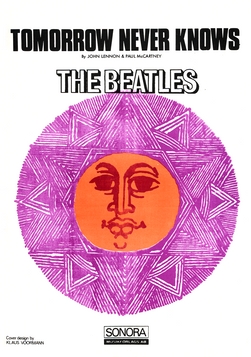Tomorrow Never Knows
Tomorrow Never Knows is a song by the British rock band The Beatles, credited to the songwriting partnership of John Lennon and Paul McCartney but primarily written by Lennon. It is the final track on their 1966 album Revolver. The song marked a radical departure from anything the band had done before, both musically and lyrically. Featuring innovative studio techniques such as tape loops, backwards recordings, and automatic double tracking, Tomorrow Never Knows was one of the first glimpses of what would become psychedelic rock.
Background[edit | edit source]
John Lennon drew inspiration for the song's lyrics from The Psychedelic Experience: A Manual Based on the Tibetan Book of the Dead, a book that Lennon had been introduced to by Timothy Leary, Richard Alpert, and Ralph Metzner, who had themselves been inspired by the Tibetan Book of the Dead. The book's guidance on dying and rebirth resonated with Lennon, leading him to craft lyrics that urged listeners to surrender to the experience, to "turn off your mind, relax, and float downstream".
Recording[edit | edit source]
Recorded in April 1966 at EMI Studios (later known as Abbey Road Studios), Tomorrow Never Knows showcased the Beatles' pioneering studio experimentation under the guidance of producer George Martin and engineer Geoff Emerick. The song featured groundbreaking use of tape loops created by the band members, which were played on various tape machines around the studio and mixed live during the recording. This technique contributed to the song's unique, otherworldly sound. Additionally, Lennon's vocals were processed through a Leslie speaker, giving them a distinctive, ethereal quality that matched the song's avant-garde feel.
Musical Structure and Lyrics[edit | edit source]
Musically, Tomorrow Never Knows is built around a simple C major chord, with a droning bass line and a steady drum beat. This simplicity serves as a foundation for the song's complex overlay of sounds, including sitar, tambura, and seagull-like tape loop effects. The lyrics, influenced by Leary's book, reflect a melding of psychedelic insight and Eastern philosophy, with lines like "Lay down all thoughts, surrender to the void," encapsulating the song's theme of ego death and spiritual rebirth.
Legacy[edit | edit source]
Tomorrow Never Knows is widely regarded as one of the most influential tracks in the history of popular music, heralding the advent of psychedelic music and studio experimentation that would become hallmarks of the late 1960s. It has been covered and sampled by numerous artists and continues to be celebrated for its innovative use of studio technology and its profound lyrical message.
Search WikiMD
Ad.Tired of being Overweight? Try W8MD's physician weight loss program.
Semaglutide (Ozempic / Wegovy and Tirzepatide (Mounjaro / Zepbound) available.
Advertise on WikiMD
|
WikiMD's Wellness Encyclopedia |
| Let Food Be Thy Medicine Medicine Thy Food - Hippocrates |
Translate this page: - East Asian
中文,
日本,
한국어,
South Asian
हिन्दी,
தமிழ்,
తెలుగు,
Urdu,
ಕನ್ನಡ,
Southeast Asian
Indonesian,
Vietnamese,
Thai,
မြန်မာဘာသာ,
বাংলা
European
español,
Deutsch,
français,
Greek,
português do Brasil,
polski,
română,
русский,
Nederlands,
norsk,
svenska,
suomi,
Italian
Middle Eastern & African
عربى,
Turkish,
Persian,
Hebrew,
Afrikaans,
isiZulu,
Kiswahili,
Other
Bulgarian,
Hungarian,
Czech,
Swedish,
മലയാളം,
मराठी,
ਪੰਜਾਬੀ,
ગુજરાતી,
Portuguese,
Ukrainian
Medical Disclaimer: WikiMD is not a substitute for professional medical advice. The information on WikiMD is provided as an information resource only, may be incorrect, outdated or misleading, and is not to be used or relied on for any diagnostic or treatment purposes. Please consult your health care provider before making any healthcare decisions or for guidance about a specific medical condition. WikiMD expressly disclaims responsibility, and shall have no liability, for any damages, loss, injury, or liability whatsoever suffered as a result of your reliance on the information contained in this site. By visiting this site you agree to the foregoing terms and conditions, which may from time to time be changed or supplemented by WikiMD. If you do not agree to the foregoing terms and conditions, you should not enter or use this site. See full disclaimer.
Credits:Most images are courtesy of Wikimedia commons, and templates Wikipedia, licensed under CC BY SA or similar.
Contributors: Prab R. Tumpati, MD






